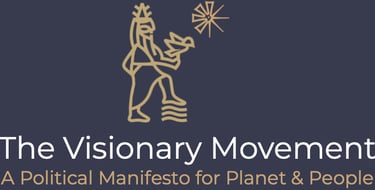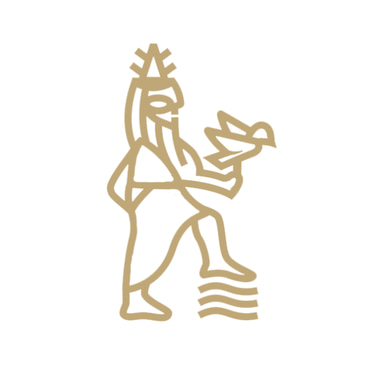Toxic Threads: The Petrochemical Fabric Challenge
Banning petrochemical textiles by 2034 and championing natural alternatives
9/5/20253 min read


Modern fashion is built on a hidden crisis. Over 60% of all clothing produced today is made from petrochemical-derived fibres such as polyester, nylon, and acrylic. These fibres are spun from fossil fuels, shedding microplastics into oceans, leaching toxins into soil, and polluting every stage of their life cycle — from production to landfill.
What is the Petrochemical Fabrics Challenge?
The Petrochemical Fabrics campaign is the Visionary Movement’s mission to end this destructive cycle. It is a call to recognise that the clothes we wear, the fabrics we furnish our homes with, and the textiles we use daily are directly linked to the climate emergency, biodiversity loss, and human health risks.
Our campaign sets a clear target: ban petrochemical fabrics in the UK by 2034 and replace them with sustainable, natural, and regenerative alternatives.
Why We Take Issue With Petrochemical Fabrics
The problems posed by petrochemical fabrics are vast, urgent, and undeniable:
Microplastic pollution: Every wash releases tiny plastic fibres that escape filters and flow into rivers and oceans, poisoning ecosystems and entering the food chain.
Fossil fuel dependence: These fabrics lock fashion into oil and gas extraction, perpetuating industries already fuelling climate collapse.
Health hazards: From skin irritants to hormone disruptors, petrochemical fibres can leach chemicals that impact human wellbeing.
Disposability culture: Cheap to make, quick to tear, and impossible to recycle at scale, these fabrics drive the “fast fashion” model — overproduction and overconsumption.
Invisible exploitation: Petrochemical fabrics often hide behind low price tags, masking exploitative labour conditions and environmental devastation in global supply chains.
Consumer deception: Retailers frequently mislabel petrochemical textiles as wool, linen, or other natural fibres — misleading customers into believing they are buying natural and sustainable fabrics when in fact they are purchasing plastic.
In short, petrochemical fabrics are not simply a fashion choice; they are an environmental and social emergency.
What We’re Doing
The Visionary Movement is building a clear framework to phase out petrochemical textiles while creating viable, sustainable alternatives. Our strategy includes:
Campaigning for legislation that bans the production, import, and sale of petrochemical fabrics by 2034.
Supporting natural alternatives such as hemp, flax, bamboo, organic cotton, wool, and regenerative bio-fibres.
Working with innovators to uncover suppressed technologies that allow fabrics to be produced cleanly, without toxicity or exploitation.
Educating the public on the hidden costs of petrochemical fabrics and the benefits of natural, durable alternatives.
Pressuring retailers to transition away from plastic-based fabrics, ensuring consumers have real, sustainable choices.
Why We’re Doing It
Because clothing is not optional. We all wear it, every day, and thus the fight against petrochemical fabrics is a fight for public health, climate security, and the right to a clean environment.
The fossil-fuelled fashion industry tells us this is the price of affordability. But affordability cannot come at the cost of poisoned oceans, collapsing ecosystems, and entire communities working in toxic factories.
By setting a 2034 deadline, we are not only calling for change — we are demanding a complete transformation of how textiles are made, used, and valued. We are doing this to prove that the UK can lead the world in building a fabric economy that is both sustainable and just.
What We’ve Achieved So Far
Our campaign has already begun to shift the narrative:
Awareness raised: We have made “toxic textiles” a public conversation, reframing cheap clothes as an environmental and health hazard.
Policy traction: The deadline of 2034 has been seeded as a legislative goal, establishing a tangible marker for industry and government.
Alternative champions: Innovators in regenerative fabrics are gaining attention, with our campaign acting as a platform to highlight their work.
Retailer pressure: Early dialogue has begun with major UK brands, pressing them to invest in sustainable sourcing ahead of legislation.
Movement building: Petrochemical fabrics are no longer a hidden issue — they are understood as a core battle in the fight for climate and social justice.
What Is Left To Accomplish
The road ahead is clear but challenging:
Legislation passed: The 2034 ban must be written into law, with enforceable penalties for non-compliance.
Supply chain reform: Global networks of production must be transformed, moving away from fossil fuel dependency.
Retail transition: Every major brand must commit to phasing out petrochemical fabrics, with transparent timelines.
Innovation scaled: Suppressed and emerging technologies must be unlocked and scaled, ensuring natural alternatives can meet demand.
Public adoption: Education campaigns must help citizens value durable, natural fabrics over fast, disposable fashion.
Conclusion
The Petrochemical Fabrics campaign is about more than clothes. It is about breaking free from a fossil-fuelled system that has wrapped itself around our very skin. By committing to a ban by 2034, we are not only protecting the planet but safeguarding future generations from an invisible crisis that touches every household.
This mission is not about aesthetics. It is about justice. And until we end our dependency on petrochemical fabrics, the Visionary Movement will keep pushing for the truth to be seen, the laws to be changed, and the alternatives to thrive.
Toxic textiles end here. Clean, natural futures begin now.
GET IN TOUCH
SUBSCRIBE FOR UPDATES
WhatsApp: +44 (0)7413 47 46 48
© 2025. All rights reserved.


FOLLOW
Support the movement: Make a Donation
